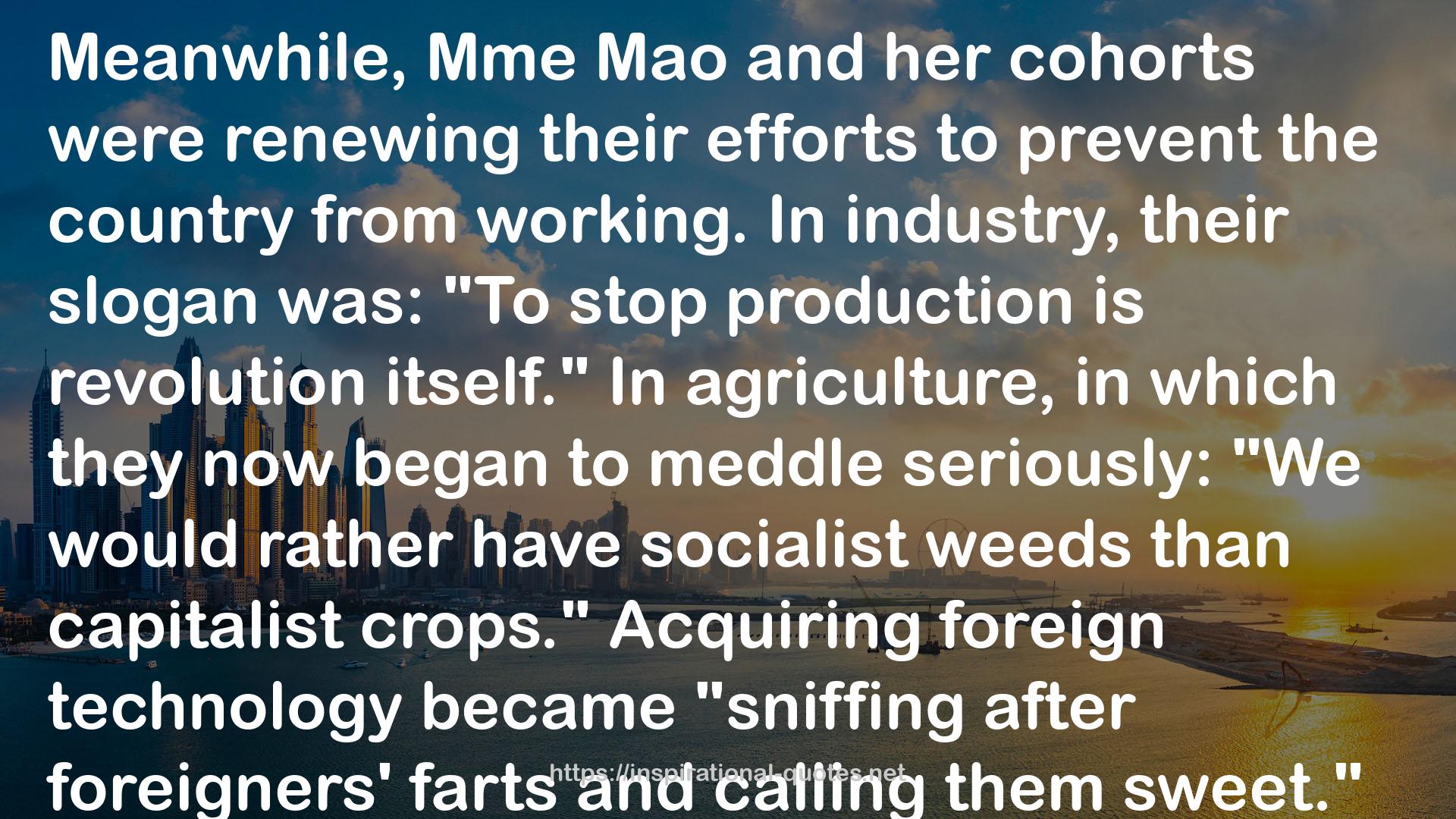" Meanwhile, Mme Mao and her cohorts were renewing their efforts to prevent the country from working. In industry, their slogan was: "To stop production is revolution itself." In agriculture, in which they now began to meddle seriously: "We would rather have socialist weeds than capitalist crops." Acquiring foreign technology became "sniffing after foreigners' farts and calling them sweet." In education: "We want illiterate working people, not educated spiritual aristocrats." They called for schoolchildren to rebel against their teachers again; in January 1974, classroom windows, tables, and chairs in schools in Peking were smashed, as in 1966. Mme Mao claimed this was like "the revolutionary action of English workers destroying machines in the eighteenth century." All this demagoguery' had one purpose: to create trouble for Zhou Enlai and Deng Xiao-ping and generate chaos. It was only in persecuting people and in destruction that Mme Mao and the other luminaries of the Cultural Revolution had a chance to "shine." In construction they had no place.
Zhou and Deng had been making tentative efforts to open the country up, so Mme Mao launched a fresh attack on foreign culture. In early 1974 there was a big media campaign denouncing the Italian director Michelangelo Antonioni for a film he had made about China, although no one in China had seen the film, and few had even heard of it or of Antonioni. This xenophobia was extended to Beethoven after a visit by the Philadelphia Orchestra.
In the two years since the fall of Lin Biao, my mood had changed from hope to despair and fury. The only source of comfort was that there was a fight going on at all, and that the lunacy was not reigning supreme, as it had in the earlier years of the Cultural Revolution. During this period, Mao was not giving his full backing to either side.
He hated the efforts of Zhou and Deng to reverse the Cultural Revolution, but he knew that his wife and her acolytes could not make the country work.
Mao let Zhou carry on with the administration of the country, but set his wife upon Zhou, particularly in a new campaign to 'criticize Confucius." The slogans ostensibly denounced Lin Biao, but were really aimed at Zhou, who, it was widely held, epitomized the virtues advocated by the ancient sage. Even though Zhou had been unwaveringly loyal, Mao still could not leave him alone. Not even now, when Zhou was fatally ill with advanced cancer of the bladder. "
Image for Quotes

Zhou and Deng had been making tentative efforts to open the country up, so Mme Mao launched a fresh attack on foreign culture. In early 1974 there was a big media campaign denouncing the Italian director Michelangelo Antonioni for a film he had made about China, although no one in China had seen the film, and few had even heard of it or of Antonioni. This xenophobia was extended to Beethoven after a visit by the Philadelphia Orchestra.
In the two years since the fall of Lin Biao, my mood had changed from hope to despair and fury. The only source of comfort was that there was a fight going on at all, and that the lunacy was not reigning supreme, as it had in the earlier years of the Cultural Revolution. During this period, Mao was not giving his full backing to either side.
He hated the efforts of Zhou and Deng to reverse the Cultural Revolution, but he knew that his wife and her acolytes could not make the country work.
Mao let Zhou carry on with the administration of the country, but set his wife upon Zhou, particularly in a new campaign to 'criticize Confucius." The slogans ostensibly denounced Lin Biao, but were really aimed at Zhou, who, it was widely held, epitomized the virtues advocated by the ancient sage. Even though Zhou had been unwaveringly loyal, Mao still could not leave him alone. Not even now, when Zhou was fatally ill with advanced cancer of the bladder." style="width:100%;margin:20px 0;"/>